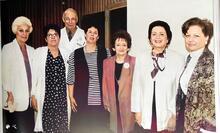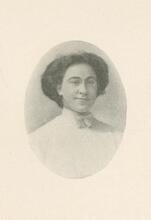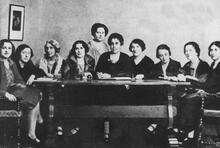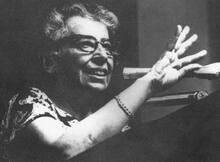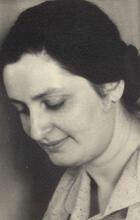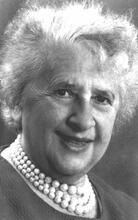Eva Michaelis Stern
Eva Michaelis Stern, who ended up devoting her life to the Youth Aliyah movement, was raised in a well-educated, assimilated German family. Despite her parents’ objections, she became a Zionist, joining the administration of the Youth Aliyah in 1933. She established and directed its fundraising and publicity arm until 1938, when she was ordered to cease her activities. Stern emigrated to Palestine before being sent to London, where she opened and directed the Youth Aliyah office, facilitating the immigration of German-Jewish youth to Palestine. Over the course of the war she helped more than 1000 children from countries all over Europe. After her return to Palestine and her retirement from the Youth Aliyah, Stern devoted her attention to organizations aiding the mentally handicapped.
Eva Michaelis Stern was the co-founder and director of the Arbeitsgemeinschaft für Kinder und Jugendalijah, the fund-raising arm of Youth Lit. "ascent." A "calling up" to the Torah during its reading in the synagogue.Aliyah in Germany, during the 1930s and director of the Youth Aliyah office in London during the critical years of World War II. From 1933 to 1938 she worked in Nazi Germany under the eyes of the Gestapo, sending thousands of Jewish children to Palestine. As head of the Youth Aliyah office in London (1938–1945), she helped hundreds of Jewish children escape from German-occupied countries and organized their journey to Palestine. After her retirement from Youth Aliyah, she devoted twenty years to caring for the mentally handicapped in Israel.
Early Life, Family, & Education
Eva Michaelis Stern was born in Breslau, Germany, on December 29, 1904, the youngest of three children of William Stern (1871–1938), a professor of psychology and philosophy at the University of Breslau, and his wife Clara (née Joseephy, 1875–1945). In 1916 the family moved to Hamburg, where Professor Stern was appointed a professor of psychology and director of the Psychological Institute at the University of Hamburg. The Stern family was steeped in German culture and far removed from Jewish life. However, during their first two years in Hamburg they sent Eva to a progressive Jewish school where some of the students came from traditional homes. These students provided Eva Stern with her first exposure to traditional Jewish life and to Zionist ideas.
After graduating from high school, Eva Stern attended a two-year training program for teachers of gymnastics. She then taught gymnastics in Hamburg and in Berlin, where many of her students were members of Zionist youth movements. Despite her parents’ objections, Eva Stern became a Zionist and joined a Zionist youth movement.
Eva Stern visited Palestine for the first time in 1926. In 1928, she was invited to teach gymnastics at the Ben Shemen agricultural school in Palestine, but after a brief stay there, she became ill and had to return to Germany. In Berlin, she resumed her Zionist activities.
In 1933, shortly after Hitler came to power, Eva Stern’s parents left Germany and emigrated to the United States. Her brother Guenther (1902–1992), who wrote under the name Guenther Anders, emigrated to the United States in 1936 after he and his wife, Hannah Arendt, were divorced in Paris. Eva Stern’s sister, Hilde (1900–1961), who was imprisoned by the Nazis for hiding non-Jewish anti-Nazi activists, emigrated to the United States after her release from prison in 1937. Eva Stern remained in Germany until 1937 partly to help her sister but also because she had become involved in rescue work.
Joining the Youth Aliyah in Germany
In 1933 Eva Stern was asked to join the administration of Youth Aliyah, a movement founded in 1932 to prepare German Jewish youngsters aged fifteen to seventeen for life on A voluntary collective community, mainly agricultural, in which there is no private wealth and which is responsible for all the needs of its members and their families.kibbutzim (communal settlements) in Palestine. She established and directed the Arbeitsgemeinschaft für Kinder und Jugendaliyah, which handled publicity and fundraising for Youth Aliyah. Her work was tolerated by the Gestapo because during the 1930s the Nazis wanted to promote the emigration of Jews from Germany. She was even permitted to travel to other European countries to promote Youth Aliyah.
In early 1938 Eva Stern was summoned to the office of Adolf Eichmann, who accused her of sending anti-German propaganda to countries outside Germany, in the guise of Youth Aliyah publicity. Eichmann ordered her to cease her activities for Youth Aliyah. Unable to continue her rescue work, Eva Stern emigrated to Palestine together with her fiancé, Dolf (Adolf) Michaelis (1906–1982), a member of the Executive of the Zionist Federation of Germany. They were married in Jerusalem in March 1938.
Establishment of the Youth Aliyah Office in London
At the request of Henrietta Szold, who directed the Youth Aliyah headquarters in Jerusalem, Eva Michaelis Stern went to London, where she opened a Youth Aliyah office. On the way to London, she stopped in Warsaw and in Prague and set up Youth Aliyah committees there. In London she took over the functions of publicity and fundraising that had hitherto been the responsibility of the Arbeitsgemeinschaft in Berlin. Her husband, who accompanied her to London, managed the Intria company, which until the outbreak of World War II handled the transfer of funds from Germany to Palestine (under a plan known as the Ha’avara agreement).
After the pogrom of November 9 and 10, 1938 (“Kristallnacht”), the Youth Aliyah office in London helped bring Youth Aliyah candidates out of Nazi Germany to surrounding countries, where they waited for certificates from the British government so that they could proceed to Palestine. Eva Michaelis Stern handled the distribution of certificates to these children, helped secure funds for transportation to Palestine from Hadassah and other Jewish organizations, negotiated for transit visas and maintained contact with the Youth Aliyah groups until their departure. During World War II she assisted more than 1000 children in Sweden, Holland, England, Lithuania, Belgium, France, Spain, and Portugal.
Many children were rescued solely as a result of Michaelis Stern’s initiative and resourcefulness. In August 1939, for example, Denmark announced that it would accept Youth Aliyah candidates from the Third Reich if the British guaranteed that the children would receive certificates. Knowing that the British would not issue such a guarantee, Eva Stern wrote a guarantee on ordinary Youth Aliyah stationery and sent it to Denmark, where it was accepted by the Danish government. As a result of her initiative, some 300 children from Germany, Austria and Czechoslovakia arrived in Denmark after the outbreak of World War II. These children survived the war.
Eva Michaelis Stern remained in England throughout World War II. She represented Youth Aliyah on the Women’s Appeal Committee for Women and Children Victims of Nazi Persecution headed by Rebecca Sieff and was honorary vice chairman of the British Youth Aliyah committee, headed by Dr. Vera Weizmann and Dr. Israel Feldman. Dolf Michaelis, who was interned briefly during the war as an enemy alien, worked for the Jewish National Fund.
Return to Palestine & Retirement
In 1945, after the end of the war, the Michaelis family returned to Palestine, where their son, David, was born. Eva served as director of the International Relations Department of Youth Aliyah in Jerusalem until 1952. After her retirement from Youth Aliyah, she founded the organization Hovevei Yerushalayim, which promoted civic improvement projects in the city of Jerusalem. She became active in AKIM, the National Association for the Habilitation of the Mentally Handicapped in Israel, and in 1960 was appointed chairwoman of its International Relations Department. She helped set up a sheltered workshop to provide employment for the mentally handicapped. Together with Irene Gaster, she founded The Shield, an organization for mentally handicapped adults and later helped establish the Irene Gaster Hostel for mentally handicapped adults. She also founded the Clara and William Stern Memorial Fund at the Hebrew University of Jerusalem to help train social workers to work with the handicapped. In 1980 she was honored by the Israel Ministry of Social Welfare for her accomplishments in the field of child rescue and aid to the handicapped.
Eva Michaelis Stern was a frequent contributor to the German-language periodical Mitteilungsblatt, published in Israel, and to other periodicals published in Israel and abroad. In 1989 she published a book entitled Emissaries in Wartime London, which included articles she had written for Mitteilungsblatt on Youth Aliyah during World War II and an essay by Dolf Michaelis on his work during the war.
Eva Michaelis Stern died in Jerusalem in 1992.
Selected Works
with Dolf Michaelis. Emissaries in Wartime London: 1938–1945. Jerusalem: Hamaatik Press, 1989
Return Trip to Childhood. Unpublished booklet: 1986
Confronting the Past: A Trip to Europe. Unpublished booklet: 1988.
Eva Michaelis Stern Collection, Central Zionist Archives, Jerusalem.
Eva Michaelis Stern Collection, Leo Baeck Institute Archives, Jerusalem.

